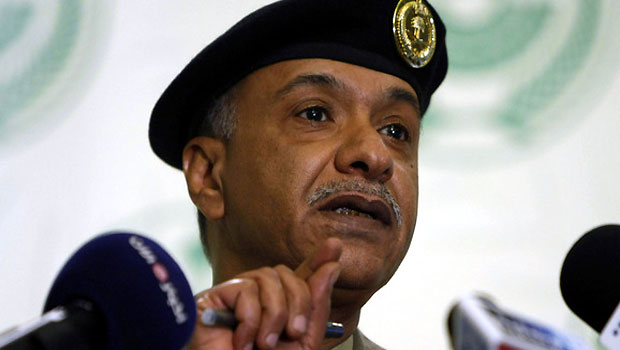
Saudi Interior Ministry Spokesman, Major General Mansour Al-Turki. (AAA Photo)
The Saudi Interior Ministry revealed that the 18 men had been arrested in Mecca, Medina, Riyadh, and the Eastern Province, adding that they had been conducting espionage activities for an as yet unnamed foreign state. The Ministry said that the men had been collecting information on vital Saudi national installations and infrastructure on behalf of a foreign intelligence agency. Although Riyadh has refused to reveal further information about this foreign intelligence agency, all information indicates that this espionage cell was working for Tehran.
Saudi Interior Ministry Spokesman, Major General Mansour Al-Turki, informed Asharq Al-Awsat that the 18 suspected spies are still being questioned.
He also denied that the detainees have any ties to the “deviant group”, which is Saudi government terminology reserved for the Al-Qaeda terrorist organization.
Speaking to state television yesterday, Al-Turki confirmed that the 18 men had been apprehended in the process of actively gathering information about vital national infrastructure which they were then sending to a foreign intelligence agency.
Dr. Abdulaziz Sager, founder and chairman of the Gulf Research Center, told Asharq Al-Awsat that information indicates that the two foreign nationals—an Iranian and Lebanese—were tasked with receiving and sending information. He added that the Saudi nationals—including doctors and university professors—were tasked with collecting this information. This information included details about the health of prominent Saudi nationals, vital national infrastructure, as well as general information regarding public opinion and views.
Sager also emphasized the geographic distribution of this espionage cell, particularly as its members were reportedly spread across 4 strategically important Saudi regions. He said that cell members were arrested in the capital Riyadh, center of political and economic information, the economically important Eastern Province, and the religious centers of Mecca and Medina. He asserted that the cell could also have sought to exploit and incite the communities in the Eastern Province, adding that Mecca and Medina are areas of convergence, particularly during the hajj and umra season.
He stressed that this cell’s primary mission would have been focused on gathering and relaying intelligence, not sabotage. Sager also cited the discovery of espionage cells in Kuwait, Yemen, and Bahrain, asserting that with the most recent arrest of this cell in Saudi Arabia, this demonstrates the existence of an extensive espionage network across the Arab Gulf.
Dr. Sager also informed Asharq Al-Awsat that the arrest of this espionage cell has international dimensions, adding that this represents blatant interference on the part of Iran. He said that it was not out of the question that the Iranian and Lebanese individuals had benefited from ethnic and sectarian considerations to obtain this intelligence.
A high-level Saudi security source, speaking to Asharq Al-Awsat on the condition of anonymity, revealed that Saudi intelligence cannot ignore the uncovering of espionage cells in Yemen, Bahrain, and Kuwait, as well as Yemen’s interception of a ship carrying Iranian arms in January. He said that investigations remain underway to discover whether the espionage cell uncovered in Saudi Arabia had anything to do with this.
The source also emphasized that the diversity of nationalities, particularly nationalities with strong ties to Iran, represents a strong indication that Saudi Arabian security and stability is being targeted by Tehran.
Dr. Abdullah Al-Marzouk, a Kuwaiti researcher specializing in Iranian affairs, told Asharq Al-Awsat that all signs indicate that Iran is behind the group arrested in Saudi Arabia. He revealed that Tehran has been working to revive the historical Persian anti-Arab approach, adding that the Iranians consider this to be a key part of their foreign policy approach towards the region.
He stressed that Iran is seeking to export its revolutionary ideology and interfere in the internal affairs of Arab states by inciting sectarian conflict. As for Tehran’s objective, Dr. Marzouk said that this is to create instability and strengthen the influence of Iran’s sectarian and ideological agents in the region with the ultimate purpose of imposing Iranian hegemony on the region. He emphasized that this approach is based on the vision of the velayat e-faqih, Iranian Supreme Guide Ali Khamenei.

Trackbacks/Pingbacks